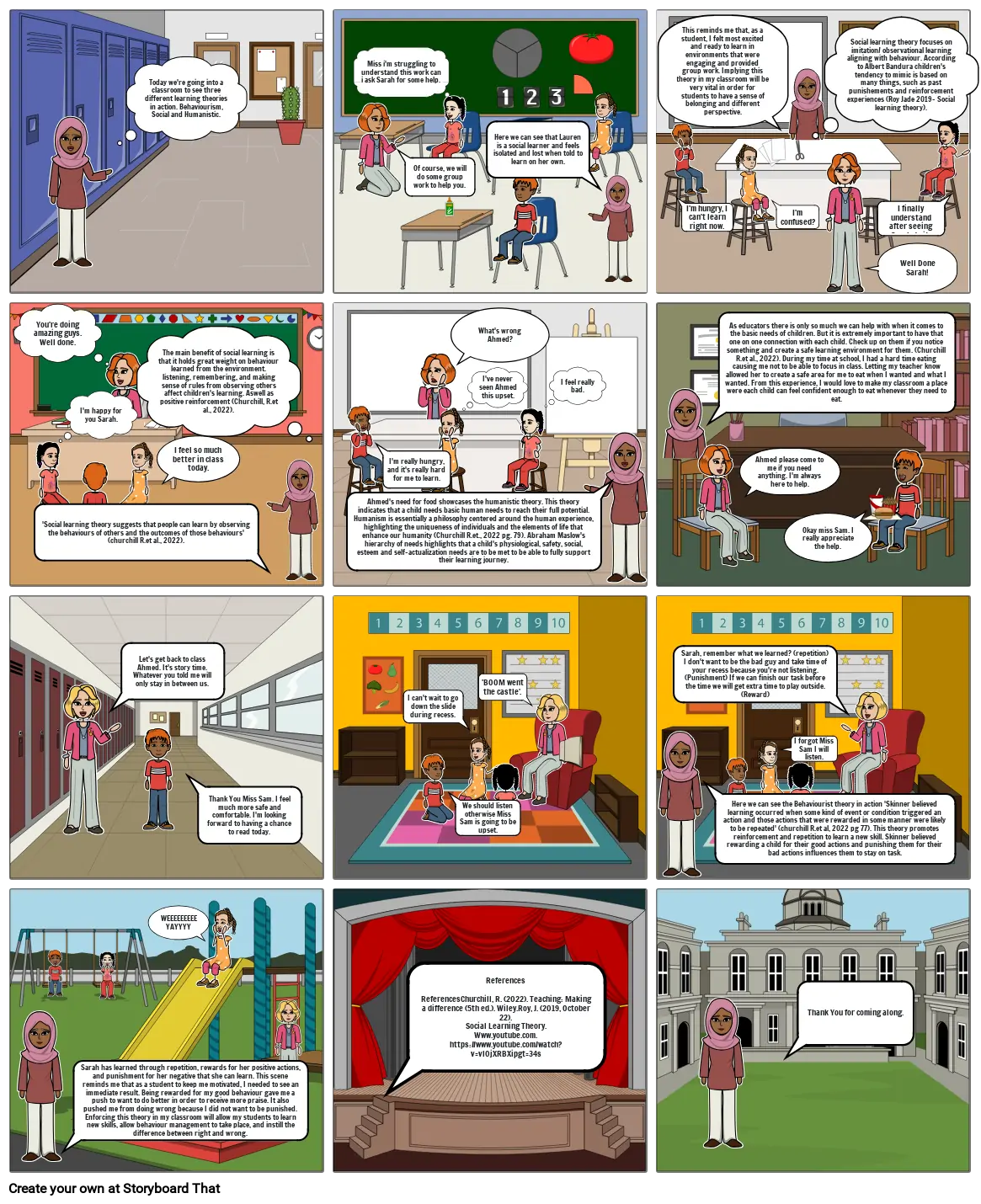Learning theories

Texte du Storyboard
- Glisser: 1
- Today we're going into a classroom to see three different learning theories in action. Behaviourism, Social and Humanistic.
- Glisser: 2
- Miss i'm struggling to understand this work can i ask Sarah for some help.
- Here we can see that Lauren is a social learner and feels isolated and lost when told to learn on her own.
- Of course, we will do some group work to help you.
- Glisser: 3
- This reminds me that, as a student, I felt most excited and ready to learn in environments that were engaging and provided group work. Implying this theory in my classroom will be very vital in order for students to have a sense of belonging and different perspective.
- Social learning theory focuses on imitation/ observational learning aligning with behaviour. According to Albert Bandura children's tendency to mimic is based on many things, such as past punishements and reinforcement experiences (Roy Jade 2019- Social learning theory).
- I finally understand after seeing Sarah do it.
- I'm hungry, I can't learn right now.
- I'm confused?
- Well Done Sarah!
- Glisser: 4
- You're doing amazing guys. Well done.
- The main benefit of social learning is that it holds great weight on behaviour learned from the environment. listening, remembering, and making sense of rules from observing others affect children's learning. Aswell as positive reinforcement (Churchill, R.et al., 2022).
- I'm happy for you Sarah.
- I feel so much better in class today.
- 'Social learning theory suggests that people can learn by observing the behaviours of others and the outcomes of those behaviours' (churchill R.et al., 2022).
- Glisser: 5
- What's wrong Ahmed?
- I feel really bad.
- I've never seen Ahmed this upset.
- I'm really hungry, and it's really hard for me to learn.
- Ahmed's need for food showcases the humanistic theory. This theory indicates that a child needs basic human needs to reach their full potential. Humanism is essentially a philosophy centered around the human experience, highlighting the uniqueness of individuals and the elements of life that enhance our humanity (Churchill R.et., 2022 pg. 79). Abraham Maslow's hierarchy of needs highlights that a child's physiological, safety, social, esteem and self-actualization needs are to be met to be able to fully support their learning journey.
- Glisser: 6
- As educators there is only so much we can help with when it comes to the basic needs of children. But it is extremely important to have that one on one connection with each child. Check up on them if you notice something and create a safe learning environment for them. (Churchill R.et al., 2022). During my time at school, I had a hard time eating causing me not to be able to focus in class. Letting my teacher know allowed her to create a safe area for me to eat when I wanted and what I wanted. From this experience, I would love to make my classroom a place were each child can feel confident enough to eat whenever they need to eat.
- Ahmed please come to me if you need anything. I'm always here to help.
- Okay miss Sam. I really appreciate the help.
- Glisser: 7
- Let's get back to class Ahmed. It's story time. Whatever you told me will only stay in between us.
- Thank You Miss Sam. I feel much more safe and comfortable. I'm looking forward to having a chance to read today.
- Glisser: 8
- 'BOOM went the castle'.
- I can't wait to go down the slide during recess.
- We should listen otherwise Miss Sam is going to be upset.
- Glisser: 9
- Sarah, remember what we learned? (repetition) I don't want to be the bad guy and take time of your recess because you're not listening. (Punishment) If we can finish our task before the time we will get extra time to play outside. (Reward)
- I forgot Miss Sam I will listen.
- Here we can see the Behaviourist theory in action 'Skinner believed learning occurred when some kind of event or condition triggered an action and those actions that were rewarded in some manner were likely to be repeated' (churchill R.et al, 2022 pg 77). This theory promotes reinforcement and repetition to learn a new skill. Skinner believed rewarding a child for their good actions and punishing them for their bad actions influences them to stay on task.
- Glisser: 10
- WEEEEEEEEE YAYYYY
- Sarah has learned through repetition, rewards for her positive actions, and punishment for her negative that she can learn. This scene reminds me that as a student to keep me motivated, I needed to see an immediate result. Being rewarded for my good behaviour gave me a push to want to do better in order to receive more praise. It also pushed me from doing wrong because I did not want to be punished. Enforcing this theory in my classroom will allow my students to learn new skills, allow behaviour management to take place, and instill the difference between right and wrong.
- Glisser: 11
- References ReferencesChurchill, R. (2022). Teaching: Making a difference (5th ed.). Wiley.Roy, J. (2019, October 22).Social Learning Theory.Www.youtube.com. https://www.youtube.com/watch?v=vl0jXRBXipgt=34s
- Glisser: 12
- Thank You for coming along.
Plus de 30 millions de storyboards créés

